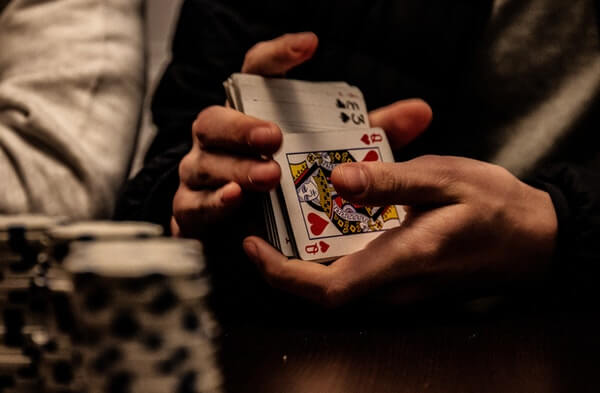Poker Vocabulary
When you’re learning how to play poker, it helps to pick up the terminology. Poker has its own vocabulary of special words and expressions. Many of these have made their way into mainstream language, both in the business world and in everyday life. Some obvious examples: I’m calling your bluff. She holds her cards close to her chest. He’s wearing his poker face.
I’d rather be lucky than good.
These common sayings are just the tip of the iceberg. Beyond these everyday sayings are many words and phrases that belong to the world of poker jargon. To those who have just started learning to play poker, they will seem like a foreign language.
Here is some of the essential jargon you are likely to hear at the poker table:
All in: A player is all in when they put all their chips in the pot, betting all their chips on the current hand. The player doesn’t participate in subsequent bets for the remainder of the hand. There’s a side-pot for other players, but the all-in player is eligible only for the main pot.
Ante: This is a small forced bet that all players must make for each hand before the cards are dealt. Everyone antes the same amount in many poker games. In Texas hold ’em, the blinds are antes.
Backdoor: In Texas hold ’em poker practice, a backdoor hand is one in which your hand is completed with the two final face-up cards, the turn and the river. The term implies you’re hoping for different cards, but you make an unlikely winning hand with the two face-up cards. A backdoor hand is sometimes called “runner runner.”
Bad beat: This is a good hand that’s beaten by a hand that hit a lucky draw.
Big slick: Ace and king.
Blinds: Mandatory bets called the small and big blinds are made by the first two players to the left of the dealer button in Texas hold ’em and other games.
Bluff: You bluff when you bet without having one of the best poker hands to play. Your hope is that other players will believe you have a strong hand so they will fold and you will win the pot.
Calling station: This is a derogatory term for a player who calls too often, typically when their hands don’t justify continued betting.
Cards speak: At the end of the hand, players turn their cards face-up to reveal who has the best hand. The cards speak for themselves.
Check raise: You check when it’s your turn to bet and then, after another player bets, you raise.
Donkey: This is a disparaging term for an opponent who doesn’t play well. Such players are also called pigeons, suckers, or fish.
Drawing dead: In the parlance of basic poker hands rankings, this is a draw that guarantees whatever card comes next, you will lose.
Flop: In Texas hold ’em, the three shared cards dealt face-up after the first round of betting are called the flop.
Heads-up: Playing against one opponent.
Isolate: This strategy entails making a raise to force others to fold so you can play heads-up against a single opponent.
Monster: A very strong hand with high chances of being a winner.
Muck: Muck refers to the act of folding and to the pile of dead cards that were formerly in your hand.
Nuts: In poker-for-dummies terms, this is the best available hand.
Out: An out is a card that improves your hand, especially to winning status. If you hold two hearts and two hearts are on the flop, you have nine outs to the nut flush – the remaining nine hearts in the deck.
Pocket rockets: In Texas Hold’em, the term refers to a pair of aces as your hole cards.
Quads: A combination of four of a kind.
Rags: These are worthless cards such as small board cards in Texas hold ’em.
Rainbow: The term “rainbow” refers to three or four cards of different suits. According to jargon conventions and poker game rules, a flop with cards of three different suits is said to be a rainbow.
River: The fifth and final shared face-up card dealt in Texas hold ’em.
Sandbag: A deceptive ploy to increase profits. You hide the strength of your hand by making only small bets at the beginning of the hand. More players stay in play, and you wind up winning more when your hand takes the pot.
Set: When you have a pocket pair and a card of the same rank hits the board, a set is created.
String bet: According to the rules of poker, this is an illegal move. It happens when a player doesn’t openly declare his intention to raise but just puts out chips to call and then reaches back to his stack to add more chips for a raise.
Tilt: A player might be on tilt after a series of bad beats. The player has lost focus and begun playing too loosely and aggressively to win a pot.
Trips: When two cards of the same rank are exposed face-up on the board and you have another of them in your hand, that’s trips. In basic poker hand rankings, it’s worth distinguishing sets and trips because only one person can hold the three cards to a set while two players can have the same trips.
Under the gun: the first player to the left of the dealer bets first. That player is said to be under the gun.
Wheel: Also called the bicycle wheel or bike, a wheel is the smallest possible straight: A-2-3-4-5.

